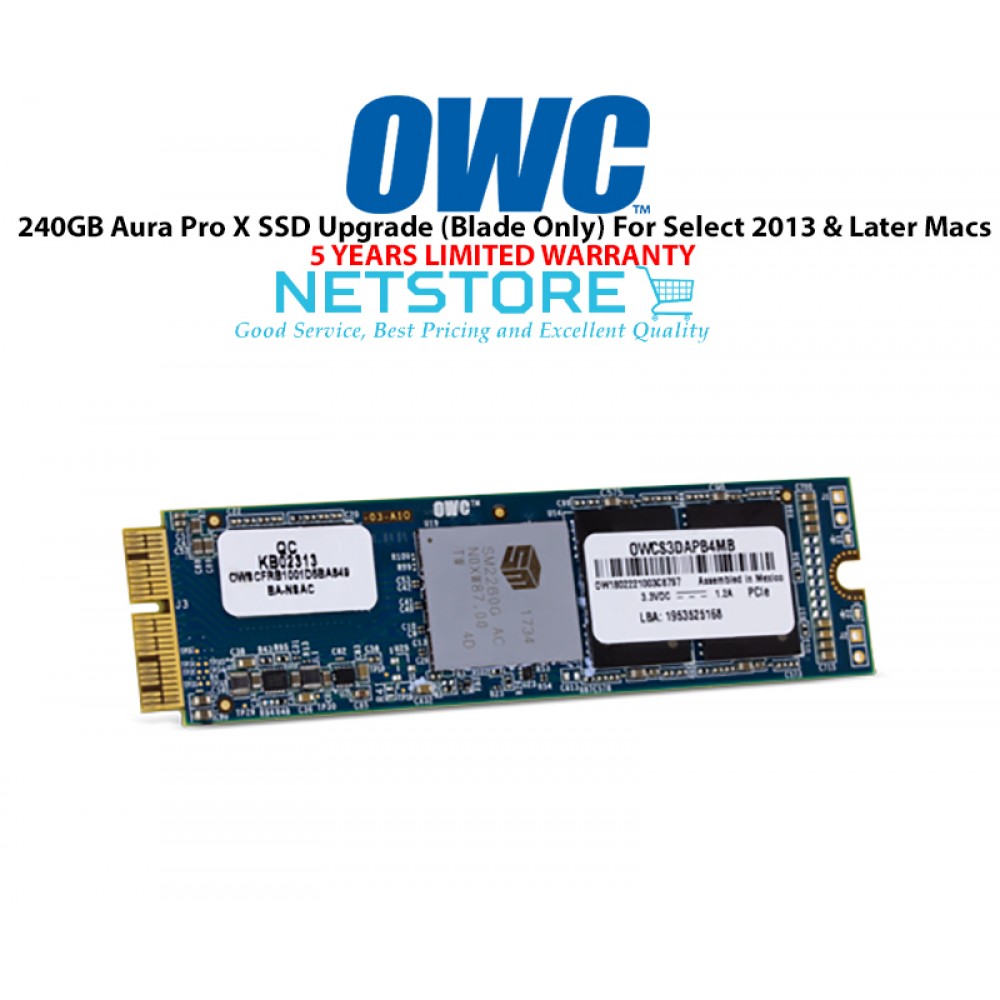
OWC AURA PRO X SSD UPGRADE
And Apple's build-to-order SSD upgrades have always been expensive even compared to the ridiculous prices most other OEMs charge.įor Mac mini and 2013 Mac Pro users, the obvious solution for a storage upgrade is to buy an adapter and use a much cheaper standard M.2 NVMe SSD. Thus, the main selling point of the Aura Pro X2 is that it allows for a big capacity upgrade: Apple never offered a 2TB option in this form factor, and for some machines even 1TB wasn't an option when they were new.

The earlier Apple PCIe SSDs based on the Samsung UAX controller are distinctly slower than NVMe SSDs, but still outperform SATA drives and are fast enough for most use cases. (This behavior was not evident when testing the Aura Pro X2 on our desktop testbed under Linux, so it seems this was due to a poor interaction between the drive and macOS/APFS.)įor users who have Apple's later PCIe SSD based on the Samsung UBX controller (also seen in the Samsung 950 PRO), upgrading to a newer drive like the OWC Aura Pro X2 won't bring any huge performance increases, but the improvements to power efficiency in newer SSD controllers and flash memory may help offset the battery life degradation in an aging notebook. In spite of this, the average across all the mixes we test was only slightly slower than the older Apple SSD. The only truly disappointing performance result was on the mixed sequential IO test under macOS, where the Aura Pro X2 was pathologically slow except with very read-heavy mixes and the pure read or write phases at the beginning and end of the test. That is pointless for the Aura Pro X2 that is intended for systems where the host CPU and OS will be the more significant bottleneck, so OWC made the right tradeoffs with this drive.

High-end drives tend to sacrifice efficiency in an attempt to set benchmark records. Surprisingly, this lower performance enabled much better power efficiency than we've seen from other drives using the Silicon Motion SM2262EN controller, though the Aura Pro X2 isn't quite as efficient as the Western Digital WD Black SN750. We found that the Aura Pro X2 was generally slower than current high-end M.2 NVMe SSDs, though it typically still outperforms entry-level NVMe drives.

Putting the Aura Pro X2 in an adapter and testing it on our usual desktop testbed allowed us to dig into its power efficiency and explore its performance potential with fewer limitations from the host system, which may be more relevant to Mac Pro users than MacBook Pro users. (from top: HP EX950 1TB, OWC Aura Pro X2, Apple SM0512F) That's something that could not be said for OWC's earlier attempts to provide an upgrade in this form factor. The differences in benchmark scores aren't always large enough to have a dramatic impact on real-world use, but the Aura Pro X2 is definitely faster overall. In spite of these limitations, the Aura Pro X2 is consistently able to deliver better performance than the Apple original SSDs, especially for random IO.

Our macOS-based testing showed that the performance differences between modern NVMe drives are largely erased by bottlenecks elsewhere: filesystem overhead and the general inefficiency of performing asynchronous IO using kernel thread pools on low-power mobile CPUs with low core counts.
OWC AURA PRO X SSD FULL
The older Macs that the Aura Pro X2 is designed for impose some performance limitations that modern machines don't experience, so in most real-world use cases the Aura Pro X2 isn't able to show off the full capabilities of its newer hardware. In principle, this allows for not only higher capacities at lower prices, but also better performance and power efficiency. The OWC Aura Pro X2 is based on much newer technology than the Apple original SSDs it is intended to replace.


 0 kommentar(er)
0 kommentar(er)
